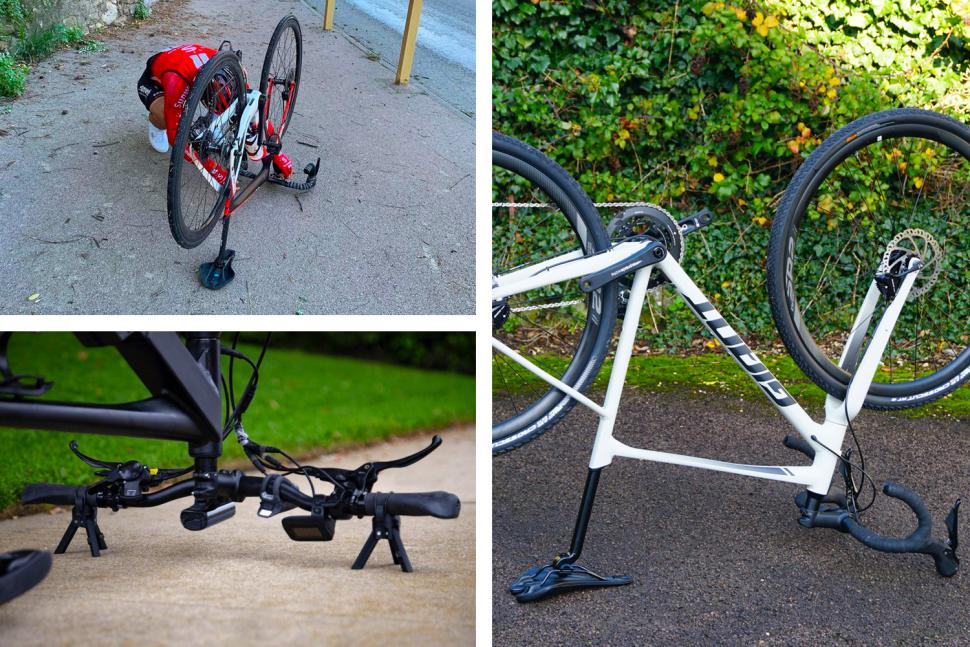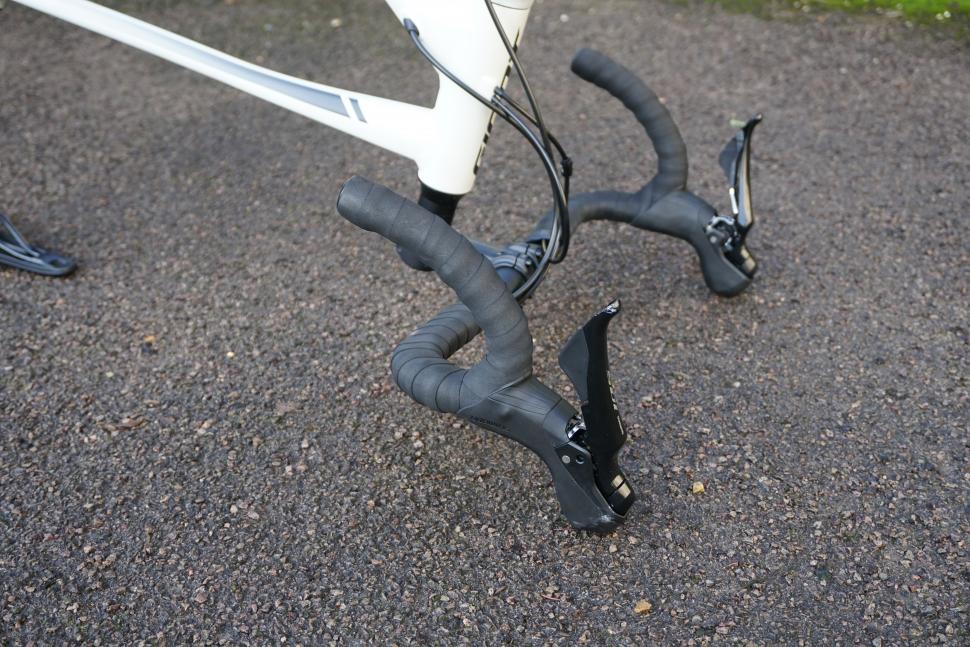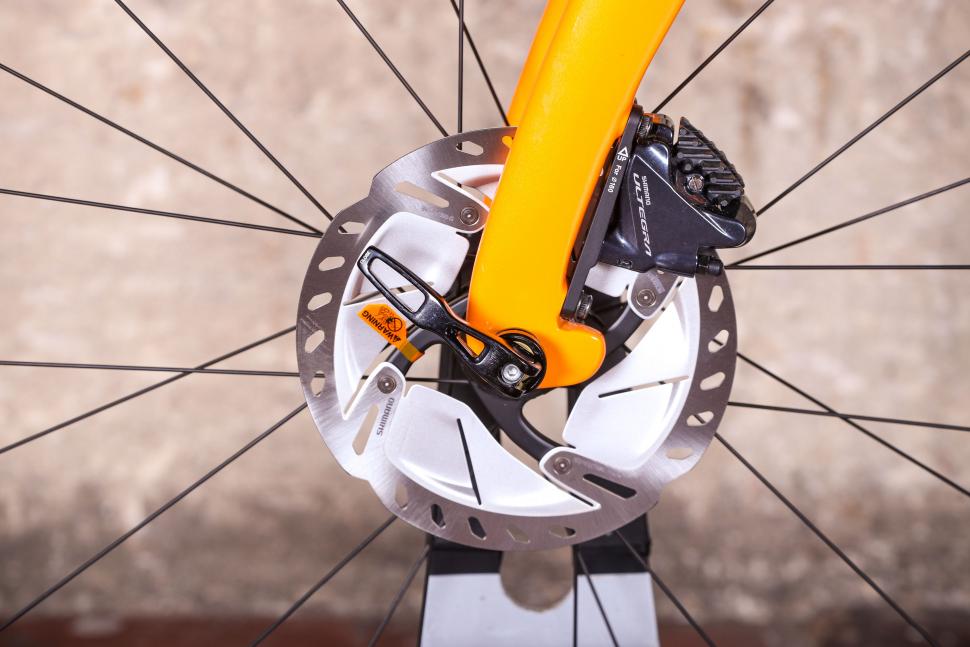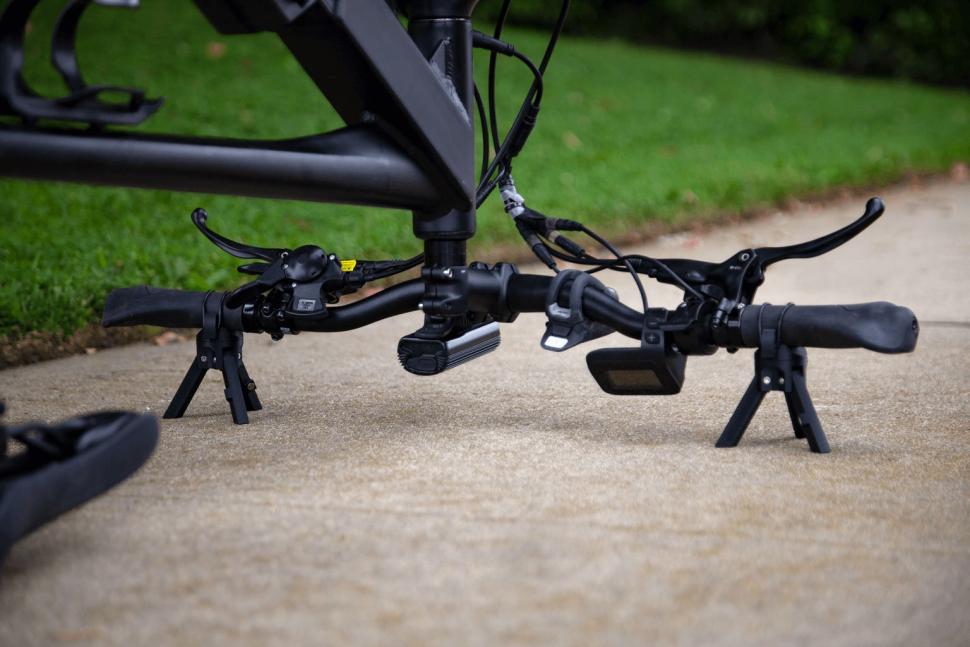- News
- Reviews
- Bikes
- Accessories
- Accessories - misc
- Computer mounts
- Bags
- Bar ends
- Bike bags & cases
- Bottle cages
- Bottles
- Cameras
- Car racks
- Child seats
- Computers
- Glasses
- GPS units
- Helmets
- Lights - front
- Lights - rear
- Lights - sets
- Locks
- Mirrors
- Mudguards
- Racks
- Pumps & CO2 inflators
- Puncture kits
- Reflectives
- Smart watches
- Stands and racks
- Trailers
- Clothing
- Components
- Bar tape & grips
- Bottom brackets
- Brake & gear cables
- Brake & STI levers
- Brake pads & spares
- Brakes
- Cassettes & freewheels
- Chains
- Chainsets & chainrings
- Derailleurs - front
- Derailleurs - rear
- Forks
- Gear levers & shifters
- Groupsets
- Handlebars & extensions
- Headsets
- Hubs
- Inner tubes
- Pedals
- Quick releases & skewers
- Saddles
- Seatposts
- Stems
- Wheels
- Tyres
- Health, fitness and nutrition
- Tools and workshop
- Miscellaneous
- Tubeless valves
- Buyers Guides
- Features
- Forum
- Recommends
- Podcast
feature
 Is putting your bike upside down wrong March 2021
Is putting your bike upside down wrong March 2021Is putting your bike upside down wrong? 67% of you say not, so why the controversy?
Do you ever put your bike upside down? It’s a question that is sure to cause heated debate amongst cycling friends anytime a mechanical occurs and somebody flips their bike over to get a better look. Here in the office, we couldn’t agree if it’s just fine or social death.
So we did a poll on Twitter, and from 926 votes an impressive 67% of you said it’s just fine, you can’t see a problem with flipping the bike. Some of the accompanying comments were quite illuminating too.
Is putting your bicycle upside down to fix a mechanical okay ot a bad thing to do?
— road.cc (@roadcc) November 4, 2019
I did this once to pump up tyres in front of someone and they were horrified at me so much they put the bike back up & did it for me.
— Cycle Mummy (@CycleMummy) November 4, 2019
As long as you remember to remove your Garmin first, the sound of the screen breaking on top of a mechanical sucks!
— Matt Williams (@mattdwilliams) November 5, 2019
More cycle fraternity bullshit normally spouted by unfit 1ride a week lycra clad £4k carbon bike SKY team kit wearing Muppets (the same types I leave for dust on my £700 COMMUTER MTB much to their disgust) the same type that didn't cycle before 2012 London when became cool.
— Guy Fartin (@Hunting4Dragons) November 5, 2019
Bad cycling etiquette or just common sense?
It’s clear that turning a bike upside down is an act of bicycle etiquette that divides opinion. The phrase it’s “not very pro” is often bandied about, so suggest it’s the sort of thing a pro would never do.
But the pros do it sometimes, as this photo shared by Richie Porte on Instagram shows Michael Matthews turning his Cervelo race bike upside down.
However, it’s clear from the accompanying comments that it is frowned upon by fellow pros and ex-pros. Robbie McEwan said: “Can’t be a pro....a pro NEVER turns his bike upside down.”
Rule #49 pic.twitter.com/Bxa9U9rosi
— Mike (@Eng32Mike) November 4, 2019
It’s inevitably not long before the “rules” get quoted here. Thumb through the Velominati rules and number 49 is “keep the rubber side down. “It astounds me whenever I see a bicycle helplessly turned upon its handlebars and saddle while the pilot optimistically leverages every muscle in their face to inspect the vehicle for evidence of its mysterious ailment,” it says.
Why would you not turn your bike upside down?
The only time you want to turn the bike upside down is to see to a mechanical issue. The most common reason for turning a bike over is to fix a flat tyre. Let’s face it, getting a wheel out of the bike can tricky, especially as you have to hold the bicycle frame in the air to avoid scratching the dropouts on the ground. Flipping the bike makes it much easier, you can get to the wheels and the bike is upright, not lying in a grass ditch.
Fettling gears and brakes can also be a bit easier too, especially if you’re indexing the gears and need to spin the drivetrain.
Reasons to avoid an upside-down bike
There are some valid reasons why you might not want to turn your bike over, other than the look you might incur from other cyclists.
The biggest problem with spinning your bike upside down when you have a mechanical is that it risks damaging/scuffing the saddle and hoods of your pride and joy. You’re also going to get dirt, mud or water on your main contact points when you get back on the bike.
You’ll also have to pick up your water bottles as they’ll have dropped out of their cages and rolled down the hill. It the cages haven’t relinquished their grip on the bottles, they might not be leaking sticking energy drink all of your frame.
The other reason you don’t want to turn your bike upside down when you have a mechanical is that it rarely makes it easier to fix the problem that occurred in the first place. It can actually make it more difficult to diagnose or repair the problem.
More problems arise with the risk of getting covered in dirt from the tyres or grease from the chain when you turn the bike over.
What about hydraulic disc brakes? The disc brakes are a totally sealed unit with oil in the lever, caliper and hose, so in theory, the orientation of your bike shouldn’t make any difference to the brakes.
That said, we have seen people hang their bike up, or turn it upside down, only to then find the brake lever is all mushy. What is the likely cause is a small air bubble that was in the system has risen to the highest point, the caliper, and this has altered the feel at the brake lever.
Shimano even recommends against turning the bicycle upside down. In a manual for its hydraulic disc brakes it says:
“The disc brake is not designed to work when the bicycle is upside down. If the bicycle is turned upside down or on its side, the brake may not work correctly, and a serious accident could occur. Before riding the bicycle, be sure to operate the brake lever a few times to check that the brakes operate normally. If the brakes do not operate normally, stop using the brakes and consult a dealer or an agency.”
In reality, you’ll probably be okay with a temporary upside down bike, but you don’t want to be storing it upside down.
What are the alternatives?
You could hang the saddle from a tree, hook the handlebars over a fence or gate, or get a friend to hold your bike for you. You can even try the method of hooking the saddle over your head which is better demonstrated by the picture below.
We’ve even had our attention drawn to a product designed specifically for this usage. The Handlebar Jack is a portable bike stand that clips to the handlebars and protects the grips and controls from the ground and makes it more stable. It’s something else to spend money on and carry with you though, so we’re not sure it’s really a solution.
Summary
It seems there's really nothing wrong with putting your bike upside down then providing you're careful, making it easier to sort a mechanical or flat tyre. It's an interesting debate that clearly gets some people worked up though, and there are pros and cons for doing it. We'd love to know what you think so getting down into the comments section and let us know.
David worked on the road.cc tech team from 2012-2020. Previously he was editor of Bikemagic.com and before that staff writer at RCUK. He's a seasoned cyclist of all disciplines, from road to mountain biking, touring to cyclo-cross, he only wishes he had time to ride them all. He's mildly competitive, though he'll never admit it, and is a frequent road racer but is too lazy to do really well. He currently resides in the Cotswolds, and you can now find him over on his own YouTube channel David Arthur - Just Ride Bikes.
Latest Comments
- matthewn5 2 sec ago
A club member had just had his 12 speed Shimano Hollowtech cranks fail... same way that the 11 speed cranks failed.
- MattieKempy 14 min 19 sec ago
Currently watching the Cyclocross Worlds on www.Sporza.be using my vpn, which I have anyway, free through my bank account. OK, so it's in Dutch,...
- Shackbu 58 min 12 sec ago
I have Eurosport as part of my Virgin TV package. They contacted me yesterday to say that becasue Eurosport was closing down they would give me TNT...
- rickiecheese 1 hour 45 min ago
An update regarding this path....
- tony.westclassics@live.co.uk 2 hours 46 min ago
Theres no boubt about it, this bloke is the kiss of death
- don simon fbpe 3 hours 19 sec ago
As you agree with me, I don't understand your point.
- Rendel Harris 3 hours 4 min ago
Absolutely without a doubt, a small example recently: I was cycling down The Mall in London from Buckingham Palace towards Admiralty Arch and...
- Rendel Harris 3 hours 38 min ago
The jacket looks funky but as far as I can see from the photographs isn't anything like as bright when hit by light as ProViz or similar more...
- cardch 4 hours 43 min ago
Just ordered mine. Went to visit them and it's a great setup, and so nice (I hope) to get something with a bit of soul, rather than another...



Add new comment
84 comments
Upside down on a grass verge - no scratches: or at a pinch take off your gloves (because always wear gloves obvs) and place under the hoods to protect from the tarmac, and your waterproof under the saddle if you're that worried about it.
(If the saddle gets ruined from standing upside down for a couple fo mins, what kind of surface are you standing it on - Sandpaper? Molten Lava?)
Laying it on it's (non drive) side makes it harder IMO to remove wheels etc and scratches the whole side of your 'bars / grips / tape and saddle. At least standing upside down it doesn't slide about.
The "Safety Warning" from Shimano strikes me as the typical over eager safety guff all manufacturers put on all equipment (if you've ever read the safety warnings that come with most cycle helmets for example, it seems that most of them are not meant to be worn for racing or dangerous riding....basically when they are most needed!)
Who pulls the brakes when it's upside down anyway? You can't really adjust / fix brakes when the bike is upside down...they're the wrong way round, out of reach......?
"You’ll also have to pick up your water bottles as they’ll have dropped out of their cages and rolled down the hill. It the cages haven’t relinquished their grip on the bottles, they might not be leaking sticking energy drink all of your frame."
If those things happen, the bottle cages and bidons should be replaced. If a cage can't hold a bidon simply by being turned upside down, it will have probably bounced out long before that anyway.
My bidons don't leak either. I use the cleverly designed Camelback bidons who ironically considering their early marketing slogan 'Unbottle yourself' now make the best water bottles.
As for those folk scared about marking your precious saddle or hoods, here's a simply tip.
After flipping bike over, very gently rest bike on ground and nothing will be marked.
Still not getting why I have to flip my bike over at all.
"Not Pro"?? We could all be more "pro" by having a mechanic and a coach follow us in the car. No need to flip the bike when there's a boot full of tools, a bike stand and somewhere warm to sit while a professional bike mechanic puts your chain back on. Maybe even get a massage while you wait. Far more "pro".
Perhaps the reason some pros have rules like this is to separate them from non-pros. No amount of pretense will change that. You can follow all the rules you like, there will always be some pros who don't want to be associated with amateurs, and will invent a way to cement the differences.
Given that many people criticize cyclists for not following rules, it seems ridiculous that we apparently have a rule for bike repair etiquette!
Flip the bike if it makes it easier. Do it carefully. Remove the bidon first. It is your bike, after all. You are free!!
Upside down EVERY time. So much easier to take wheels off and no danger of chipping and scratching your paintwork on your forks etc. Laying it on the side is a bit naff, but each to their own. I've not damaged my saddle and hood rubber doesn't mark that easy...and can be cheaply replaced if need be (I haven't needed to in 9 years)
Pros get their bikes free, they couldn't care less about damaging the paint...ignore them...
Has anyone changed their mind on this issue since this was first posted?
HERETICS!
Here's another reason:
I was cycling with a friend last summer when her Di2 on her fancy new bike stopped working. It was a hilly area so we nursed it to a bike shop who tried to figure out what had gone wrong.
Turns out she had washed it upside down and water had got into the seat post and nerfed the battery. She looked sheepish and got the train home, then spent £100+ on a new Di2 battery.
Always a subject that flushes the gringos out of the undergrowth
I did turn my bike upside down once. Apart from everything falling out of bags, saddle and hood scuffs, everything was back to front, couldn't work it out.
The reason you must never turn your bike upside down is that dust, rust and gunk could fall down the seat tube and get into the bottom bracket bearing.
Oh no, wait a moment...
[Joking aside, the cure for that is to cut a collar out of an old margarine tub and slip it around the bearing inside the bottom bracket shell. And an empty yoghurt pot makes a good receptacle to stop you losing the cotter pins while you're doing it!]
I say fook looking like a pro. I'm not a pro and don't have a team car loaded with mechanics and spares following my every move. Nor do I receive a new frame every year. It's a damned sight easier to remove a rear wheel to fix a flat when the bike's upside down. Never scratched or dinged a frame that way, but I do know a guy who bent a derailleur hanger while trying to do things the 'pro' way.
Oh Sheeesh! The things we clutch our pearls about. As long as your aren't on it when it's upside down, it's all good.
Like previosly mentioned, just don't set it on you computer or lights. But then, if your dumb enough to do that, lesson learned
I have a cargo bike so I just take my Feedback Sports Pro Elite with me.
At my BMX club we encourage riders to park their bikes upside down.
Or, rather than faff about positioning gloves under the hoods and my jacket under the saddle, which are both items I also like to look after and therefore wouldn't use as a groundsheet, I can just leave the bike upright.
People only give a shit because it's in The Rules. Not everyone who leaves their bike upright is doing it to make you feel inferior, you know.
Er, you don't have to. But those who do get it may do so if they wish.
I have.
I have decided as a matter of policy to simply ignore anyone who tries to tell me I shouldn't be doing something innocuous that makes it easier for for me to complete the task at hand.
Exactly that - easier to get the wheels on and off when the bike's upside down...
Any reasoning behind that?
What looks like a brown stick?
A brown stick.
With the many short branch trees in the hills. Maybe gloves on a couple of sticks, (are they sticks while still attached to a trunk?) Jacket worn around the far side and wolla.. An upright bike stand that could look posh and easier than back packing a stand. He my daft (tree be he, not 1,2 or yea) mate while I build deft drafting Duggy.
WAZZA
Indeed they can and I wouldn't bat an eyelid, but that indifference doesn't seem to be reciprocated by the non-precious/hipster/frat-boy types who throw caution to the wind fix a puncture wheels-up. So, it's two things that I don't get.
Yeah but it's easier to get the frame on and off if the bike's the correct way up...
Important training for the bikes - they need to get used to being upside down during front and back flips. BMX's are a bit flighty like that, they need to be coaxed upside down the first few times.
Nooo much easier to get the wheels off up the right way - and especially getting them back on, your weight makes sure that the wheel is properly into the dropout. Well, in my experience, anyway.
Sometimes put the bike upside down on the carpet inside if I need to do a bit of instant gear adjustment. Never outdoors though.
This isn't a 'pro' thing it's traditional wisdom passed down from the days when brake cables exited the top of the levers. Resting the bike on these would cause damage whatever surface it's on. I still find it offensive to see a bike like that and think it's a bad habit to get into. You can easily damage something if you do it without thinking and by the time you've taken off your bottles, garmin, lights etc you could find a fence/gate to prop/hang it from.
This question is a bit like asking a group of Norwegians do you store your firewood bark side up or down, it’s a good way to start a less than civil war…
For me it’s a moot issue. Since I recently sold my vintage road bike, I’m left with none I’ll be thinking about turning upside down anyway. Of my remaining bikes, 3 have Nexus hubs, and two of them have roller brakes (the Catrike has one as a drag brake), the Gazelle has a dynamo front hub as well. If there’s a flat on the road you find it and patch it with the wheel in situ or walk home because it’s a pita taking a wheel off. The other is a Tern GSD and you can stand it vertically on its rear rack.
As 'Froze' sort of mentions, not turning bikes upside down started in the days when all brake cables came from the top of the levers, so resting the weight of your bike on the junction between solid lever housing and flexible steel cable would be likely to crush or kink the cable.
I've never turned bikes upside down because I got into the habit for the above reason and never got out of it. It just feels so wrong, but really that's not rational is it? Unless you have a vintage bike with up-sprouting cables obviously.
Exactly this. Back in the day, you would see plenty of 10-speeds with the cables exiting the top of the hoods at a nasty bent angle, because the riders had turned them upside down and bent the ends of the cable outers. Looked bad, and couldn't be fixed in my experience.
Pages